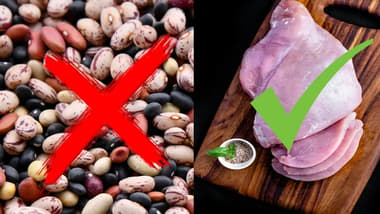Complete Nutrition Guide for Kenyans Beginning Their Fitness Journey on a Budget
Everything you need to know about nutrition as a beginner.
Everything you need to know about nutrition as a beginner.

Let's be honest – most nutrition advice online assumes you live somewhere with a Whole Foods on every corner and unlimited disposable income. This guide is for Kenyans who need practical, affordable strategies that actually work in real life.
First things first: you’re probably not eating enough to sustain your overall fitness progress. Most active people underestimate their calorie needs by 20-30%. If you're constantly tired, struggling to recover, or not seeing progress despite consistent training, inadequate fuel is likely the culprit.
A rough starting point: multiply your body weight (in kg) by 30-35 for total daily calories. A 70kg athlete needs roughly 2,100-2,450 calories daily. Track your intake for a week using any calorie app – you'll be surprised how much (or little) you're actually eating.
Your muscles need amino acids to repair and grow. Aim for about 2g per kg of body weight if you're training seriously. For our 70kg athlete, that's 140g of protein daily.
Smart protein choices in Nairobi:
Don't overthink protein timing. Spread it across your meals, but don't stress about the mythical "30-minute anabolic window." Your body is smarter than that.
Carbohydrates get demonized, but they're essential for anyone training consistently. Your brain and muscles prefer glucose for fuel, especially during intense exercise.
Pre-workout: Something light and familiar 1-2 hours before training. A banana, some ugali, or sweet potato work well. Don't experiment with new foods before important sessions.
Post-workout: Get some carbs within an hour if possible. Pair them with protein for better recovery. A simple meal of rice and beans with some vegetables covers all bases.
Daily sources: Focus on whole foods – sweet potatoes, nduma, fruits, and yes, even ugali in reasonable portions. The key is portion control, not elimination.
Healthy fats support hormone production, reduce inflammation, and help you absorb fat-soluble vitamins. About 25-30% of your daily calories should come from fat.
Great fat sources:
You lose more fluids than you think through sweat and breathing. Start each day with a large glass of water and keep a bottle nearby throughout the day.
Your urine color is the best hydration indicator – aim for pale yellow. If it's dark, drink more. If it's completely clear, you might be overdoing it.
For training sessions longer than an hour, add some electrolytes. Coconut water works, or simply add a pinch of salt and lemon to your water bottle.
Iron: Especially important for women and endurance athletes. Red meat when budget allows, dark leafy vegetables, and beans. Pair iron-rich foods with vitamin C sources like oranges or tomatoes to enhance absorption.
Vitamin D: Most people are deficient. Get some sun exposure daily, and consider a supplement if you train mostly indoors.
Magnesium: Involved in over 300 enzymatic reactions. Groundnuts, dark chocolate, and leafy greens are good sources.
B vitamins: Found in whole grains, eggs, and leafy vegetables. Important for energy metabolism.
Forget complicated meal timing protocols. Here's what actually matters:
Don't train completely fasted for intense sessions. Have something light beforehand if needed.
Eat within 2 hours post-workout when possible. Your muscles are most receptive to nutrients during this window.
Eat consistently throughout the day. Three main meals plus 1-2 snacks keeps energy levels stable.
Listen to your hunger cues. If you're genuinely hungry, eat. If you're eating out of boredom, find something else to do.
Markets vs. supermarkets: Fresh produce is usually cheaper and fresher at local markets. Stock up on non-perishables at supermarkets when there are sales.
Buy seasonal: Mangoes in season are incredibly cheap and nutritious. Root vegetables are consistently affordable year-round.
Bulk buying: Grains, legumes, and nuts are much cheaper in bulk. Find a wholesale market and stock up.
Prep once, eat twice: Cook large batches of staples like rice, beans, or stews. Portion and refrigerate for quick meals throughout the week.
Breakfast: Protein (eggs), some carbs (bread/ugali), vegetables if possible, fruit.
Lunch: Protein source, substantial carbs (rice/ugali/sweet potato), vegetables, healthy fat.
Dinner: Similar to lunch but adjust portions based on evening training schedule.
Snacks: Fruit with nuts, yogurt, or simple sandwiches.
Most supplements are expensive solutions to problems that don't exist. Focus your money on quality food first.
Actually useful:
Skip the rest until your basic nutrition is dialed in perfectly.
Eating too little: Chronic under-fueling leads to poor recovery, mood swings, and plateaued performance.
Copying elite athlete diets: They have different genetics, training loads, and budgets. Focus on what works for your situation.
All-or-nothing thinking: One bad meal doesn't ruin your progress. Consistency over perfection.
Ignoring food quality: Cheap, processed foods might fit your macros but won't optimize how you feel and perform.
Overcomplicating things: Good nutrition is simpler than the internet makes it seem.
Perfect nutrition is expensive and time-consuming. Most people need good-enough nutrition that they can stick to consistently.
Aim to eat well 80% of the time. That other 20% is for social events, convenience meals, and life happening. Don't let perfect be the enemy of good.
Focus on whole foods, adequate protein, staying hydrated, and eating enough total calories. Master these basics before worrying about nutrient timing, superfood powders, or any other advanced strategies.
Your performance will improve more from consistent, good-enough nutrition than from perfect nutrition you can only maintain for two weeks.
Continue reading with these related fitness and health articles




Join the conversation!
Share your thoughts on "Complete Nutrition Guide for Kenyans Beginning Their Fitness Journey on a Budget" below.